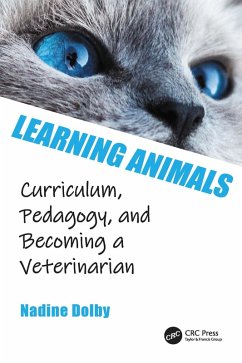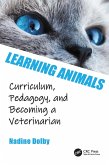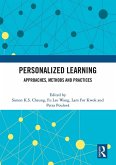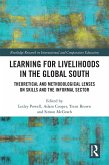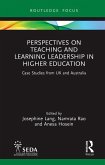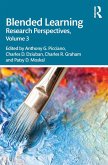Dieser Download kann aus rechtlichen Gründen nur mit Rechnungsadresse in A, B, BG, CY, CZ, D, DK, EW, E, FIN, F, GR, HR, H, IRL, I, LT, L, LR, M, NL, PL, P, R, S, SLO, SK ausgeliefert werden.
-- Helena Pedersen, Senior Lecturer, Unit for General Didactics and Pedagogic Work, University of Gothenburg, Sweden; author of Schizoanalysis and Animal Science Education and Animals in Schools: Processes and Strategies in Human-Animal Education
In Learning Animals, Nadine Dolby provides a critical, richly descriptive point of departure for much-needed conversations about learning with, rather than on and about, our more-than-human world. It will come as no surprise that Dolby's research is the product of a well-practiced and remarkably sensitive qualitative eye. Qualitative researchers, in particular, will value the deeply reflective methodological chapter that details the experienced researcher's continued growth through deliberate, close attention to human and non-human relationships.
-- Amy Stich, Associate Professor of Higher Education, University of Georgia, USA
Learning Animals offers a unique educational perspective into the pedagogy of veterinary training. As a professor of education, Nadine Dolby adds a necessary voice to the conversation about animals in our society: how we learn about them, how we think about them, how we treat them, and how it is all connected. Much of what is written about veterinary education is produced by veterinarians themselves. But if we want to know the impact of educational practices more fully, then we need to read the analyses of scholars of education, social scientists, those in the humanities, and all others outside of the profession who study these institutions. Dolby conducted in-depth interviews with a cohort of veterinary students over the four-year course of their program. In this book, she helps guide the reader through stories spanning four years of explicit and implicit instruction on how students are to think and feel about animals, supporting her research with detailed excerpts from intensive conversations with students. Her work aptly presents her findings with rich data, so the reader can understand this social scene and its consequences; but she also brings an empathetic compassion to this presentation, so the reader can understand why they should care.
-- Jenny Vermilya, author of Identity, Gender, and Tracking: The Realty of Boundaries for Veterinary Students
In Learning Animals, Nadine Dolby examines how veterinary education shapes the ways veterinary students experience animals and construct professional identities. Based on in-depth personal narratives of veterinary students collected over five years, Dolby shows how veterinary education transforms the relationships students have with animals. Consequently, even those perceived as experts on animal welfare and rights have little knowledge and understanding in these areas. Through meticulous research and masterly writing, Learning Animals shines valuable light on the philosophical and ethical assumptions behind the formal veterinary curriculum. Dolby's book opens up new possibilities for understanding and re-imagining relationships between humans and other animals.
-- Leslie Irvine, Professor and Undergraduate Chair, Department of Sociology, University of Colorado Boulder, USA
Nadine Dolby has constructed Learning Animals to provide the first, critical qualitative study of the perspectives and experiences of those who are often considered society's experts on nonhuman animals as they study to become veterinarians. This qualitative research study demonstrates the moral tensions imposed when the love of other living beings is countered by society's privileging of human needs and desires over all others. While learning to address the suffering of nonhuman animals, veterinarians are taught to inflict harm on them resulting in both narrowed human/nonhuman relations and increased mental (and physical) anguish for both nonhuman and human animals. Increasingly, human/nonhuman relations are recognized as important in a range of fields, from anthropology, sociology, education, and critical animal studies, to reconceptualizations of qualitative research in ways that acknowledge the multispecies entanglements and anthropocentrism often present in even justice oriented qualitative research. What these relations mean for living with other creatures is not often acknowledged or examined. This volume describes an extremely important and timely project that challenges dominant knowledge in a field that has attempted to claim expertise regarding nonhuman creatures. Further, the insights are broadly applicable to our understanding of the problems imposed by human animals on other animals as well as other forms of life and materiality. Learning Animals provides a critical perspective for everyone concerned with justice for those who have historically suffered as objects of human privilege - concerns that are of profound and long-term consequence for all of us, demonstrating the need to radically rethink what we think we know and how we relate to all living others around us.
-- Gaile S. Cannella, Former Professor Texas A&M University, Arizona State University; and Velma Schmidt Endowed Chair of Critical Childhood Studies, the University of North Texas, USA
What does the process of becoming a veterinary professional do to our souls, and what does that show us about how our society regards animals (and those who work with them)? Nadine Dolby explores these questions through a longitudinal study of veterinary students in North America, but the issues she raises speak to many of the problems that trouble the modern veterinary sector across the developed world. She argues that the gruelling process of veterinary training forces students to adopt a mindset where, paradoxically, their original love for animals is devalued and driven underground. Is professionalism a matter of acquiring technical skills and knowledge, or of forcing conformity with a worldview where animals are valued conditionally and welfare is too often compromised?
This thought-provoking book is a welcome contribution to the new field of veterinary humanities, bringing analysis from sociology and other disciplines to bear on the problematic subject of veterinary education and work today. Dolby clearly reveals the ethical difficulties of this challenging sector. For those becoming, living as, educating or supporting veterinarians, her perceptive insights offer a troubling but illuminating basis for deep reflection on the modern difficulties of professional identity.
-- Alison Skipper, MRCVS, Department of History, King's College London, and Co-Convenor, Veterinary Humanities UK
As this excellent book demonstrates, one way to understand a profession is to determine how people in the field are educated. I have been involved with veterinary education since the early 1970s, at which time the role model was the "macho tough guy" who was famous for "punching out" a recalcitrant bull. I took offense at that approach, and helped to erode that mind set. As greater and increasing numbers of veterinary students were from an urban background, sensitivity to the animals became increasingly common. Simultaneously, small animal and companion animal concerns increased significantly, inevitably changing veterinary school teaching. The author is an early student of these changes, which greatly influenced her teaching and scholarship. I would go so far as to suggest that her work constitutes an invaluable path to understanding recent changes in veterinary education and practice.
-- Bernard E. Rollin, Professor of Philosophy, Animal Sciences, and Biomedical Sciences, Colorado State University, USA
Years ago, I asked the campus veterinarian at my institution how to safely reduce the weight of some rhesus monkeys so that they would be more motivated (i.e, hungry) to work for rewards in a learning experiment. Instead of answering with a list of health status indicators, he asked me if I knew enough about monkeys 'as monkeys' to presume to access the dynamics of their intelligence. This question put the dimension of welfare front and center. The next decades revealed how rare such learning moments were. Professor Dolby's deep and thorough volume takes on the question about how little we know about educating veterinarians and others whose lives are intertwined with animals. She doesn't scold, but at last leads the direction to crucial change.
-- John P. Gluck, Emeritus Professor, University of New Mexico

